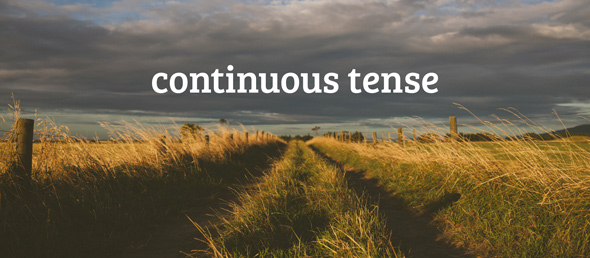
You probably already know that continuous verbs are be + -ing verbs.
am typing
are walking
is singing
was yelling
were galloping
will be happening
But do you know when to use continuous verbs?
Here are 5 simple rules for when to use the continuous (progressive) tense.
#1 We use the continuous tense to describe actions that are already in progress at the moment of focus. Is the action already happening? Is it in motion? That’s a good sign we should use the continuous tense.
Present: My students are taking a test right now.
Past: When I walked in the room, my phone was ringing loudly.
Future: My roommate will be throwing a party in our apartment Friday night.
#2 We use the continuous tense to describe an action that is happening at the moment, in contrast to habitual actions. Do you normally do something everyday, but today you are doing something else? That would be a time to use the continuous tense.
Present: Uncle Stan usually brushes his horses every afternoon, but today he is washing them instead.
Past: My grandparents usually travel to Florida for the winter, but a couple summers ago, they were traveling to California.
Future: Most Saturdays Felix stays home, but this Saturday, he will be attending a play in Nashville.
#3 We use the continuous tense to express repeated actions. If it’s a habit, use the simple tense, but if it’s an action that is repeated again and again, use the continuous tense.
Present: My cat Louisa is always climbing up on my kitchen cabinets.
Past: As a young girl, my parents were constantly reminding me to clean my room.
Future: When we own our own home, we will be mowing our lawn quite often.
#4 We use the continuous tense to describe a temporary situation, rather than a permanent one. Think of the simple tense as the tense used to describe permanent situations, and the continuous tense as the tense used to describe changing situations. If it’s only happening for a moment, use continuous. If it’s here to stay, use simple.
Present: Katherine works for the National Parks Services, but she is helping her father with his new business this month.
Past: I usually live in the U.S., but in the summer of 2004, we were living in a cabin in Switzerland.
Future: We will be moving to a new home in July. Until then, we will be renting an apartment down the street.
#5 We use the continuous tense to express uncompleted actions. The person may not be doing the action at this exact moment, but if it is an ongoing project or other incomplete action, use the continuous tense.
Present: Nathan is translating a book into Spanish this year.
Past: Joanna and Josiah were still painting their house last time I talked to them.
Future: Finley and Ayla will still be sleeping when we get home.
Knowing when to use continuous verbs isn’t the only thing you should know. Here’s a link for 5 rules on how to use the simple tense. Also, if you really want to master the English tenses, you could take the course on Udemy called Top 5 Most Useful English Tenses.



